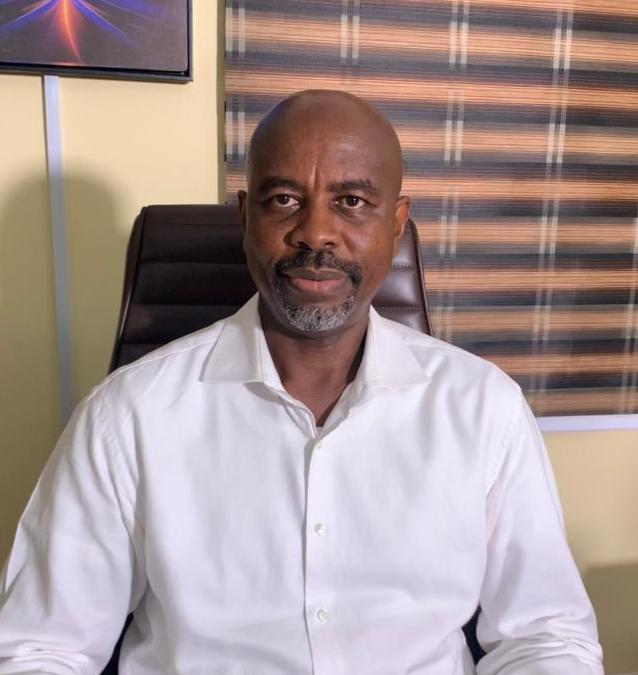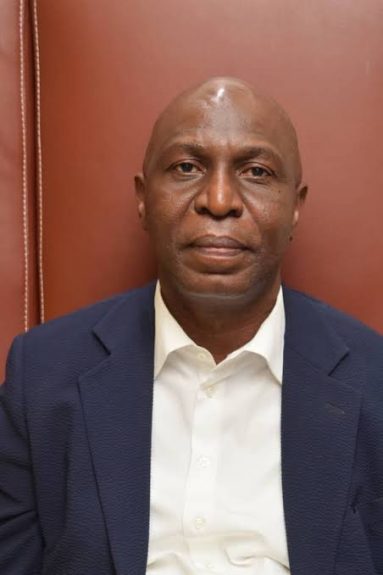
Udu Yakubu
President Muhammadu Buhari had not been laid to rest when Sam Omatseye dusted off his thesaurus to launch a verbal barrage on a man whose silence and restraint perhaps shielded Omatseye from greater embarrassment during his own missteps in journalism. In his piece titled “Anticlimax”, published in The Nation of 14 July 2025, he demonstrated that there was no cure for his mortal hatred of one of the foremost builders of modern Nigeria. That was a saddening moment for many people of good conscience. But the public deserves a reminder of Omatseye’s own history of blunders.
We cannot forget when Omatseye posted a photograph featuring the late Ismaila Isa Funtua and Godwin Emefiele. Sam Omatseye shared a photo on social media claiming it showed Mamman Daura, President Muhammadu Buhari’s nephew, giving instructions to the Central Bank Governor Godwin Emefiele. He used the image to bolster a narrative about an Aso Rock cabal allegedly working to sabotage Bola Ahmed Tinubu’s presidential bid. However, the man in the photo was not Mamman Daura at all, it was the late Ismaila Isa Funtua, a close associate of Buhari and a member of his 2015 U.S. delegation where Emefiele was also present. This wasn’t a slip of the tongue or pen; it was typed, tweeted, and stood for months. It wasn’t just an error; it was a demonstration of the kind of sloppy, impulsive, and reckless commentary that has long dogged Omatseye’s brand of journalism. The correction came not from him, but from those who still care about facts.
It raises real questions about his credibility, mental sharpness, and the brand of junk punditry he continues to peddle under the guise of journalistic service. If Omatseye can’t tell two very public figures apart, why should anyone trust his interpretation of complex national issues?
Omatseye’s hostility toward President Muhammadu Buhari is not sudden. It has simmered over the years and finally found its most scathing release in death. But what makes his tirade truly jarring is not just its timing, but its hypocrisy. This is the same Sam Omatseye who has spent the past decade anchoring himself as one of Bola Tinubu’s most loyal and visible defenders. He is not simply a columnist; he is an advocate, a narrative engineer who has invested considerable energy in painting Tinubu as the messianic reformer Nigeria has waited for. From his columns to his essays, public talks, and even books, Omatseye has served not only as a writer but as a steward of the Tinubu myth.
And that is where the contradiction begins. Because in the process of myth-making for one man, Omatseye has chosen to burn down the legacy of another, regardless of merit, record, or even historical memory. He tries to reduce Buhari to a selfish, aloof, unimaginative figure who “loved cows more than people” and governed with “a deadness of ideas.” But these are not evaluations, they are brutish sentiments and hateful exaggerations. Conveniently, they also absolve Tinubu of inheriting anything of worth. They allow Omatseye to recast the Tinubu presidency as a phoenix rising from ashes; ashes he now claims were left by Buhari.
But when we move beyond Omatseye’s metaphors and political allegiance, and look at facts, a different picture emerges. During Buhari’s eight-year tenure, Nigeria certainly faced economic turbulence. Inflation rose, as it always does in all economies of the world. But even in those challenges, there were policy buffers in place. Buhari maintained fuel and electricity subsidies because he understood the devastating ripple effects their removal would cause. Welfarism serves the public cause, but comes at a significant cost to the state. That was the economic path that he chose, rather than what played out subsequently when subsidies were removed, more revenue accrued to government, but the masses became poorer. His government introduced the largest social intervention programmes in the history of Africa – N-Power, TraderMoni, conditional cash transfers, school feeding programmes, etc., that reached millions of vulnerable Nigerians. Whatever their imperfections, they strongly acknowledged the reality of the poor and sought to relieve it.

President Muhammadu Buhari
In contrast, within just two years of Tinubu’s presidency, the administration Sam Omatseye has so passionately endorsed, Nigerians have faced some of the worst economic conditions in history. Fuel subsidies were removed abruptly, sending prices from ₦197 per litre to over ₦900. The naira was floated and subsequently collapsed, now hovering above ₦1,500 to the dollar, and over ₦2,200 to the pound sterling. Electricity tariffs have more than doubled for many households, piling further strain on already-stretched incomes. Food inflation remains painfully high, and prices in most cases remain more than double the pre-2023 levels. While the minimum wage was increased to ₦70,000 a month in 2024, relentless inflation and a weakened currency have eroded its value. Under Tinubu’s administration, poverty has become an ever-present reality for millions, with living standards deteriorating for many Nigerian families.
Yet, despite all of this, Omatseye finds compassion and nuance in analyzing Tinubu’s struggles. He frames Tinubu as a bold reformer battling inherited crises and entrenched sabotage. But where is that same balance for Buhari? Where is the recognition that Buhari too faced oil price collapses, a global pandemic, a global recession, and an insurgency-ravaged North-East? In comparison, Tinubu “ain’t seen nothing,” as some would say, except the crises he created himself by the policy and politics road he chose to travel.
The Buhari administration’s record is not spotless, but it is very dishonest to claim he left Nigeria in ruins. He completed numerous major infrastructure projects—Lagos-Ibadan expressway, Second Niger Bridge, Abuja-Kaduna rail, Zungeru hydroelectric plant. He re-equipped the military with modern equipment and air power to combat terrorism. Over 70 new universities were licensed and commenced business in the country under his watch. He digitized civil service payroll systems, removing tens of thousands of ghost workers. He passed the Deep Offshore Act to ensure more revenue from oil majors, a reform his predecessors had dodged for decades. These were not the actions of a man “dead of ideas.”
If anything, the legacy Tinubu now builds on is partly Buhari’s. Most of the infrastructure Tinubu touts today came from Buhari-era initiatives. Even the “tough reforms” that Tinubu has implemented: fuel subsidy removal and naira floatation were policies that Buhari resisted not out of ignorance, but out of concern for their social impact on the masses. Buhari travelled the welfarist road; Tinubu is driving down the Bretton Wood neoliberal avenue. In spite of the COVID-19 pandemic and economic recessions, Buhari placed more money in the hands of Nigerians at the expense of the state; Tinubu’s reforms have placed more money in the hands of the state at the expense of the masses – government has more money than ever, but the masses are poorer than ever. Tinubu has aggressively upturned many of the policies and programmes of Buhari, and the masses are poorer for it. Has Omatseye heard the cries of “We are hungry” in Isale -Eko? No, he probably doesn’t. He is too well paid at Tinubu’s The Nation to understand the groanings of the masses, and the imperatives of a welfarist approach to governance in a developing economy.
What Omatseye offers is not a historical evaluation, but a literary purge. It is a calculated demolition intended to cast Tinubu in brighter light by darkening Buhari’s memory. He accuses Buhari of hypocrisy and betrayal, particularly in the 2023 elections. But even that is a misrepresentation. Buhari did not impose a successor. He allowed a democratic primary process. He did not sabotage Tinubu in any way. Fact is, he could have stopped Tinubu at several points if he wanted to. There were those who wanted him to do so. Even the Obidients who were anti-Buhari asked for an annulment of the election. But Buhari was an uncommon democrat. He told those who cared to listen that Nigerians should decide for themselves. He allowed the electoral process to run its course; a rarity in Nigerian politics, and a sign of respect for institutional independence and democratic process. That Omatseye interprets this neutrality as betrayal says more about his expectations, critical capacity and sense of judgment than Buhari’s conduct.
Posthumous courage is not bravery; it is opportunism. And for someone who seeks to present himself as a voice of moral clarity, Omatseye’s opportunism reveals the hollowness behind the performance.
What, then, is the real issue here? Omatseye wanted a president who would return media patronage, flatter his ideology, and reward loyalty with proximity. Buhari was too austere for that. He shut down the cozy media pay structure of the Goodluck Jonathan era. He starved the industry of political breadcrumbs. And for people like Omatseye, that was unforgivable. His grudge is not about national development; it is about personal displacement.

Mr. Sam Omatseye
In the end, Buhari was not perfect. But he was not a man of vanity. He governed with discipline. He left behind real infrastructure across various sectors for further national development. He refused to play godfather to anyone. And in an era when politics is often reduced to personal loyalty, he chose to keep his distance rather than coronate a successor. That is an uncommon level of integrity that small minds cannot understand.
Omatseye may continue to seek relevance by trying to twist the facts of history. But those of us who live through the consequences of leadership know the difference between fact and myth, as we now do the difference between day and twilight, which is the comparison that the masses would make between pre-May 2023 and today. History is and will continue to recognize Buhari as a deeply principled man; one who governed with wisdom and concern for the welfare of the common people; one who always showed restraint, not vengeance, the provocation notwithstanding. And one who, in death, remains great and whose legacies cannot be erased by an army of hollow men.
Dr Udu Yakubu is Editor of the five-volume administration history, Muhammadu Buhari: The Nigerian Legacy (2015-2023), and can be reached at: udu.yakubu@gmail.com
